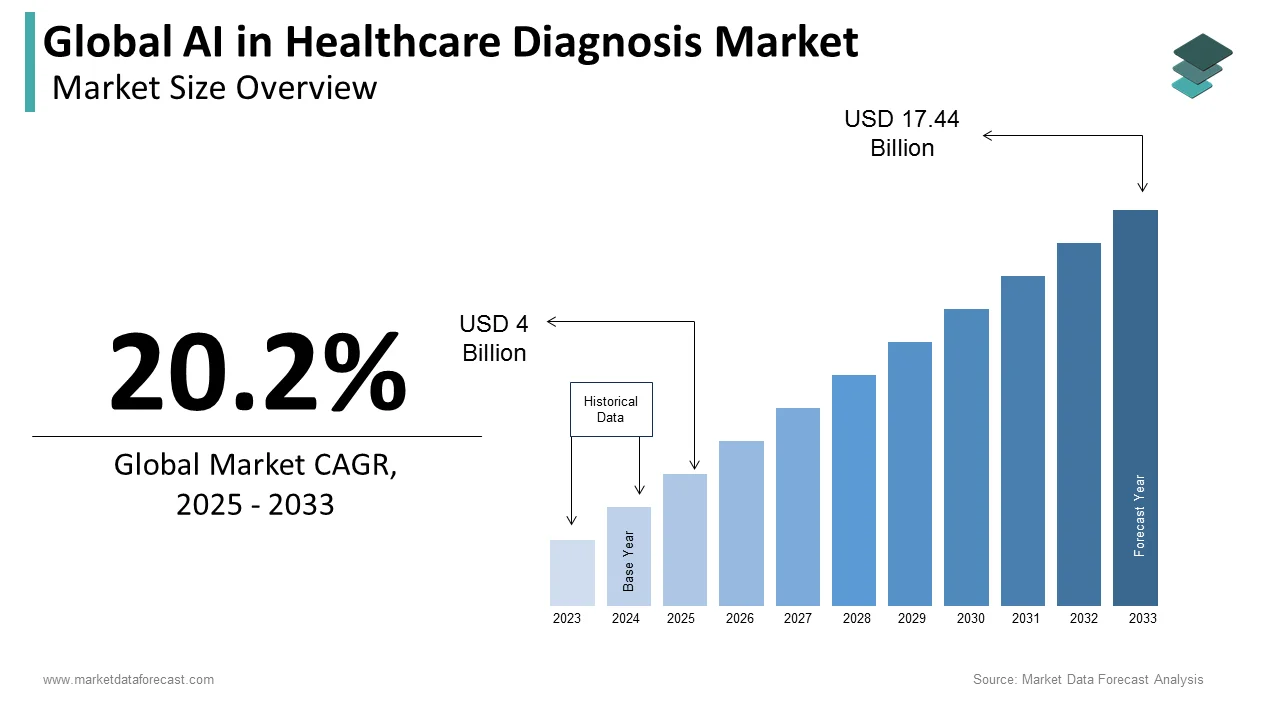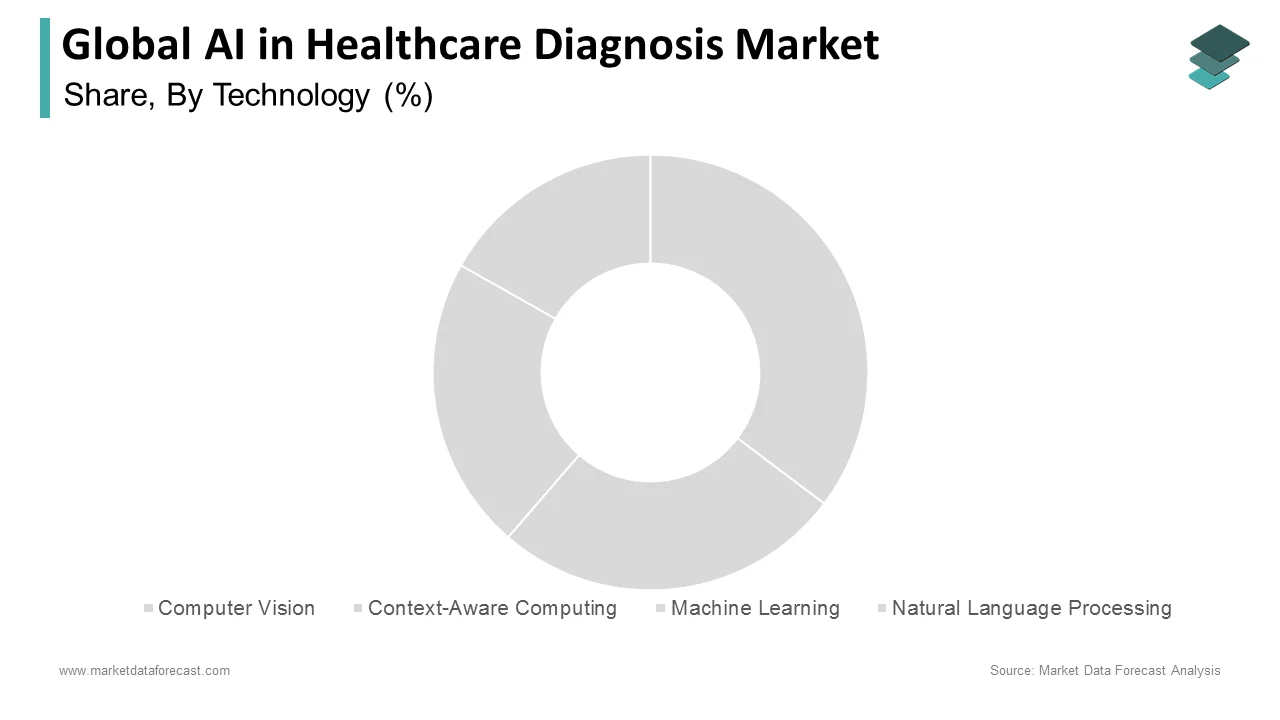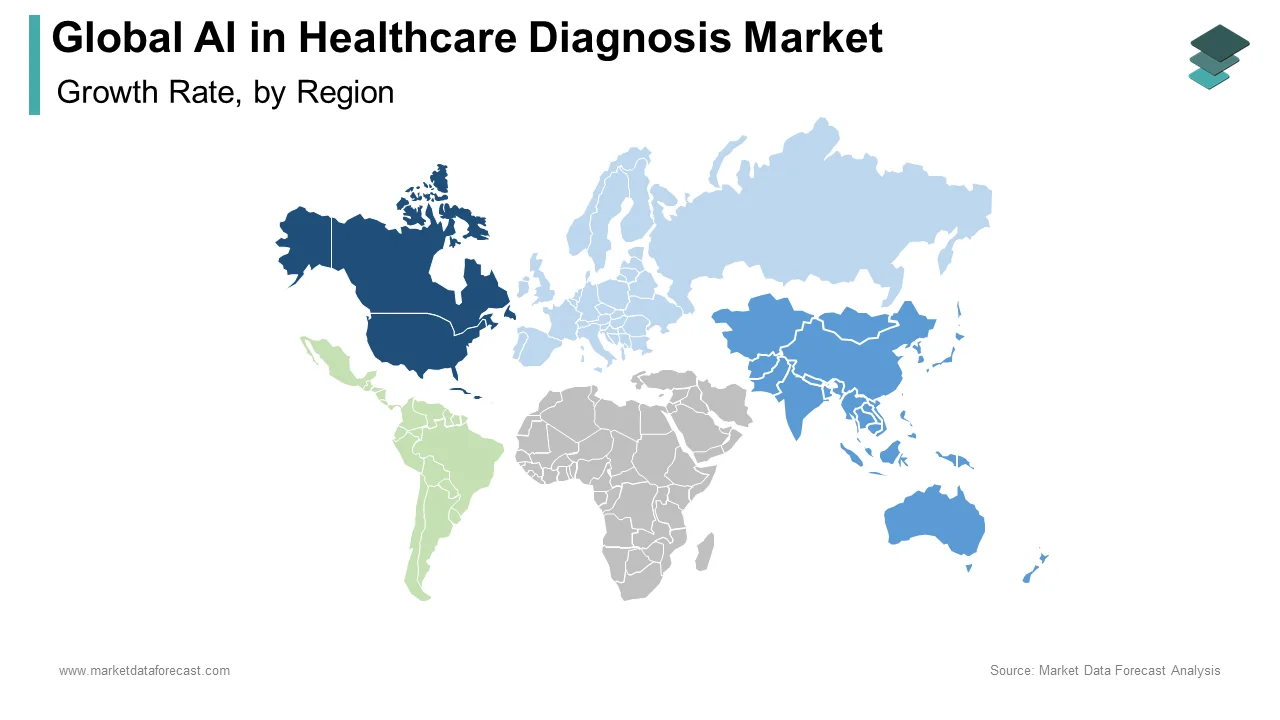Global AI in Healthcare Diagnosis Market Size, Share, Trends & Growth Forecast Report By Technology (Computer Vision, Context-Aware Computing, Machine Learning and Natural Language Processing), Application (Hardware, Software and Services), End-User and Region (North America, Europe, Asia-Pacific, Latin America, Middle East and Africa), Industry Analysis From 2025 To 2033.
Global AI in Healthcare Diagnosis Market Size
The size of the global artificial intelligence in healthcare diagnosis market was worth USD 3.33 billion in 2024. The global market is anticipated to grow at a CAGR of 20.2% from 2025 to 2033 and be worth USD 17.44 billion by 2033 from USD 4 billion in 2025.

Diagnosis is essential in disease prevention. AI in healthcare diagnosis integrates artificial intelligence and its associated technology with medical diagnostics to enhance outcomes. Diagnosis determines an illness, disorder, or disability based on its signs and symptoms. A clinical history, physical check, and examinations such as blood tests, imaging tests, and biopsies can help make a diagnosis. Traditionally, the diagnosis was performed using outdated approaches, but progress in healthcare diagnosis has paved the way. Artificial intelligence technology has significantly contributed to cybersecurity, manufacturing, education, and logistics. It has also changed healthcare, especially in diagnosis and treatment decisions, patient participation and adherence, and administrative practices of the healthcare workforce.
Artificial intelligence in medical diagnosis brings various benefits to the emerging healthcare industry, such as optimizing patient satisfaction and minimizing equipment downtime, low-cost testing procedures, accurate and reliable report processing, rapid diagnostic data generation, and early diagnosis, saving millions of lives. Deep learning technologies aid in analyzing images and recognizing patterns to create algorithms that increase the accuracy of guessing the correct diagnosis, allowing physicians to identify complex diseases more quickly and accurately. AI-powered applications, such as MRIs, x-rays, and CT scans, also assist physicians with more reliably diagnosing patients and prescribing the most appropriate treatment.
MARKET DRIVERS
The growing penetration of AI in cancer diagnosis primarily propels AI to grow in the healthcare diagnosis market.
The rising cancer incidence is a significant factor driving AI in the healthcare diagnosis market. According to the American Cancer Society, an estimated 1.9 million new cancer cases were triggered in 2021. Cancer is still the most dangerous condition, but early detection plays a vital part in patient recovery. Deep learning is the most often used AI in healthcare diagnosis to detect cancer. AI technology improves the accuracy and pace of cancer detection, aids professional decision-making, and improves cancer health outcomes. According to a new report published in the Journal of the National Cancer Institute, the AI system has attained breast cancer screening sensitivity comparable to that of a typical breast radiologist. In addition, using computed tomography (CT) decreases lung cancer mortality. The NCI-sponsored National Lung Screening Trial (NLST) found that screening for low-dose helical CT reduces the risk of dying from lung cancer by 20% in people aged 55 to 74. Other examples are Pathai, Buoy Health, Enlitic, and Freenome, which have been discovered to save many lives as a blessing for cancer diagnosis, lowering the death rate. As a result, the use of artificial intelligence in cancer detection is increasing.
Increased investment in AI healthcare is fuelling the rise of AI in the healthcare diagnosis market.
AI in healthcare has recently become a huge draw, and as a result, many organizations and governments are investing in start-ups. Thousands of AI start-ups focus on artificial intelligence, machine learning, and other AI technologies, with a significant focus on AI-driven imaging and diagnostic solutions. According to CB Insights' latest AI global funding survey, AI start-ups raised a whopping $26.6 billion in 2019 from a total of 2,235 investment transactions. Developed countries such as the United States and the United Kingdom have been tech hotspots, with the government even endorsing AI start-ups. For example, the UK government has allocated £20 million to 15 innovative AI projects ranging from early cancer diagnosis to clinical care and wearable medical devices. With this increase in funding, many start-ups are motivated to do business, which leads to an increase in the growth of AI in the healthcare diagnosis industry.
Rising partnerships between organizations to create new technology for diagnosis push AI in the healthcare diagnosis market forward.
Many pharma firms are drawn to the artificial intelligence market because of its benefits and widespread use in diagnosis. As a result, several businesses are now partnering with AI companies to develop AI-powered solutions. E.g., in February 2021, Google Cloud, with its machine learning platform, collaborated with the mass-market medical technology firm Hologic to diagnose cervical cancer. Hologic's cytology platform uses artificial intelligence and digital optical imaging to identify precancerous lesions and cervical cancer cells. Because of the increasing need for AI-based diagnostic solutions, these developments help companies achieve a competitive advantage. As a result, there has been an increased demand for artificial intelligence in diagnosis.
MARKET RESTRAINTS
However, the growth of global AI in the healthcare diagnosis market is anticipated to be hampered by low adoption and unwillingness from healthcare professionals to try and adapt to AI technologies.
Impact of COVID-19 on global AI in the Healthcare Diagnosis Market
COVID–19 wreaked havoc on the healthcare system, resulting in millions of worldwide deaths. The pandemic necessitates more services such as personnel, equipment, and other resources. Artificial intelligence opens a plethora of possibilities in the healthcare industry. Disease diagnosis has been critical in this coronavirus case, not just for coronavirus infection but also for other diseases. Patients with other diseases have a high risk of coronavirus infection. Consequently, the use of X-rays and CT scans to detect infections has risen significantly. Chest computed tomography (CT) is an important tool in treating patients with SARS-CoV-2 infection.
Also, AI-based diagnosis is useful in three main groups of COVID-19 situations, including segmentation and quantification of pathological lung opacities, binary diagnosis of COVID-19, and separating COVID-19 from non-COVID-19 pneumonia. As a result, many countries are rapidly adopting artificial intelligence for coronavirus detection. In addition, as the United States struggles to navigate the pandemic, life sciences leaders establish and maintain confidence in AI's ability to monitor the dissemination of COVID-19 cases, increasing the demand for AI-driven diagnostics.
Moreover, many companies are working to create new products to diagnose COVID–19. In June 2020, for example, Zebra collaborated with IFC portfolio company Apollo Hospitals Group in India to deploy its tools to increase the speed and efficiency of COVID diagnosis. In addition, Medivolve and Marvel Diagnostics have completed the first stage of clinical testing of BlowFISH, a non-invasive exhaled breath diagnostic technology for COVID-19.
REPORT COVERAGE
|
REPORT METRIC |
DETAILS |
|
Market Size Available |
2024 to 2033 |
|
Base Year |
2024 |
|
Forecast Period |
2025 to 2033 |
|
CAGR |
20.2% |
|
Segments Covered |
By Technology, Component, Application, End-User, and Region. |
|
Various Analyses Covered |
Global, Regional, and country-level analysis; Segment-Level Analysis, DROC; PESTLE Analysis; Porter’s Five Forces Analysis, Competitive Landscape; Analyst Overview of Investment Opportunities |
|
Regions Covered |
North America, Europe, APAC, Latin America, Middle East & Africa |
|
Market Leaders Profiled |
Microsoft Corporation, Digital Diagnostics, GE Healthcare, Quibin, IBM Corporation, Koninklijke Philips N.V., Google LLC, IDx Technologies Inc., Medtronic Plc, Zebra Medical Vision, Neural Analytics, Vuno Inc., Caption Health, Inc., Siemens Healthineers AG, AliveCor, Riverain Technologies, LLC, Welltok Inc., and Others. |
SEGMENTAL ANALYSIS
By Technology Insights

Based on Technology, the machine learning segment in the AI healthcare diagnosis market is expected to develop at the fastest rate during the forecast period. The usage of various sensors and devices to track a patient's health state in real time and the expanding acceptance of deep learning in various healthcare applications, particularly in medical imaging, disease diagnostics, and drug development, is augmenting the market's expansion. Furthermore, over the next several years, advances in AI and deep learning will likely make disease detection more efficient.
By Component Insights
Based on components, the software segment has risen to the top of the market in terms of revenue. This significant proportion can be attributed to the development of AI-based technologies for healthcare diagnostics. One of the important reasons driving the market is the rising demand for AI-powered and cloud-based enhanced diagnostic solutions that enhance diagnostic precision when interpreting medical images of a patient.
By Application Insights
Based on application, owing to the increased development of AI-based software available for diagnostic imaging, the Radiology segment is predicted to be the fastest-growing segment throughout the forecast period; In clinical patient management, radiological imaging detection is essential. Due to its high-end performance in image recognition, machine/deep learning with Convolutional Neural Networks (CNNs) has recently gained much attention. The most frequent radiological imaging modalities are chest and lung radiographs, which account for many large datasets now accessible to AI researchers, allowing them to precisely detect clinical problems such as pneumonia, pneumothorax, edema, and fibrosis.
The neurology segment is the next dominating segment in the market. Epilepsy, Alzheimer's disease, Parkinson's disease, ischemic brain stroke, and multiple sclerosis are among the neurological conditions for which AI diagnostics can provide early detection and accurate diagnosis.
By End-User Insights
Based on End-User, The Hospital and Healthcare Provider segment held the largest market share in 2024, and the segment is predicted to show the highest CAGR in the market during the projected period. The use of AI has grown in hospitals with the rise in the prevalence of chronic conditions such as cancer and uncommon illnesses as the technology aid in giving better treatments, especially to newborns with complicated disorders.
REGIONAL ANALYSIS

Geographically, North American AI in the healthcare diagnosis market is predicted to dominate the global market. This is due to the increasing use of healthcare IT solutions in medical diagnosis, the well-established healthcare industry, and ample funding for AI-based diagnosis software development. In North America, the United States leads the market for artificial intelligence in diagnostics.
During the forecast period, the Asia Pacific market is expected to be the most lucrative, with a considerable growth rate. Increasing government initiatives to encourage healthcare providers and other healthcare organizations to adopt AI-based diagnostic technologies and increasing nonprofit investments and cost reductions are expected to drive the growth of AI in the diagnostics market in the Asia Pacific during the forecast period.
KEY MARKET PARTICIPANTS
Some of the noteworthy players operating in the global AI in healthcare diagnosis market profiled in this report are Microsoft Corporation, Digital Diagnostics, GE Healthcare, Quibin, IBM Corporation, Koninklijke Philips N.V., Google LLC, IDx Technologies Inc., Medtronic Plc, Zebra Medical Vision, Neural Analytics, Vuno Inc., Caption Health, Inc., Siemens Healthineers AG, AliveCor, Riverain Technologies, LLC, Welltok Inc., and many others.
These payers work on product launches, partnerships, and acquisitions to gain market share.
RECENT MARKET DEVELOPMENTS
- In April 2021, Mayo Clinic launched a new digital platform program to offer clinical decision-making resources, medical insights, and treatment guidelines to help doctors make more reliable diagnoses and provide patients with continuous care.
- In August 2020, Digital Diagnostics Inc., formerly IDx, announced the acquisition of Boston-based 3Derm Systems, Inc. As a result of this acquisition, Digital Diagnostics is now the world leader in healthcare autonomous AI.
MARKET SEGMENTATION
This research report on the global artificial intelligence in the healthcare diagnosis market has been segmented and sub-segmented based on the technology, component, application, end-user, and region.
By Technology
- Computer Vision
- Context-Aware Computing
- Machine Learning
- Natural Language Processing
By Component
- Hardware
- Memory
- Network
- Processor
- Services
- Deployment & Integration
- Support & Maintenance
- Software
- AI Platform
- AI Solutions
By Application
- Cardiology
- Chest & Lung Scanning
- Neurology
- Oncology
- Pathology
- Radiology
By End-User
- Healthcare Payers
- Hospitals & Healthcare Providers
- Patients
- Pharmaceuticals & Biotechnology Companies
By Region
- North America
- Europe
- Asia Pacific
- Latin America
- Middle East and Africa
Frequently Asked Questions
What was the value of the global AI in healthcare diagnosis market in 2024?
The global AI in healthcare diagnosis market size was worth USD 3.33 billion in 2024.
Which region is anticipated to showcase the fastest CAGR in the global AI in healthcare diagnosis market?
The Asia Pacific regional market is anticipated to showcase the fastest CAGR in the global AI in the healthcare diagnosis market during the upcoming years.
Related Reports
Access the study in MULTIPLE FORMATS
Purchase options starting from $ 2500
Didn’t find what you’re looking for?
TALK TO OUR ANALYST TEAM
Need something within your budget?
NO WORRIES! WE GOT YOU COVERED!
Call us on: +1 888 702 9696 (U.S Toll Free)
Write to us: [email protected]
